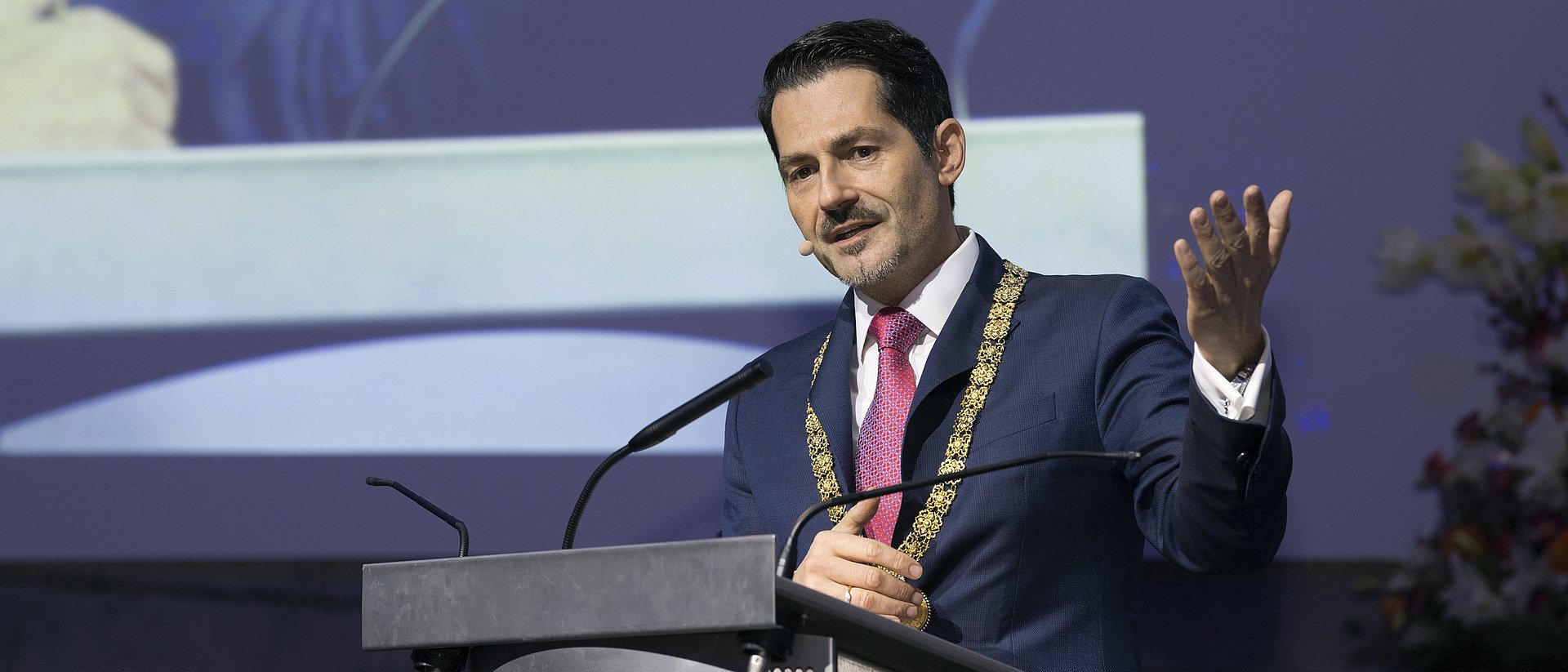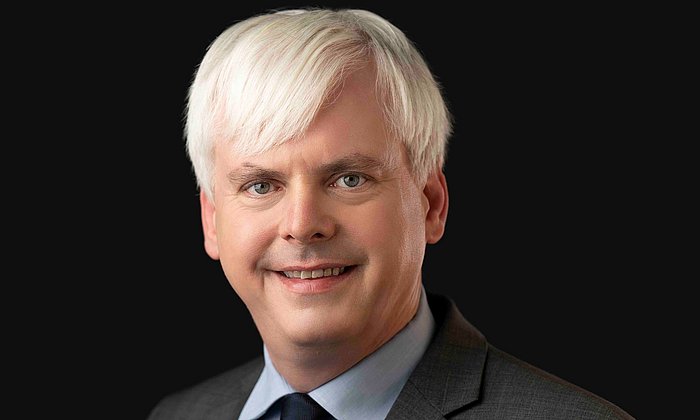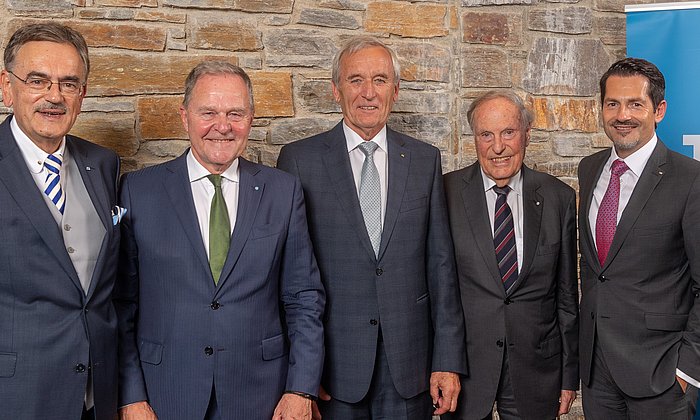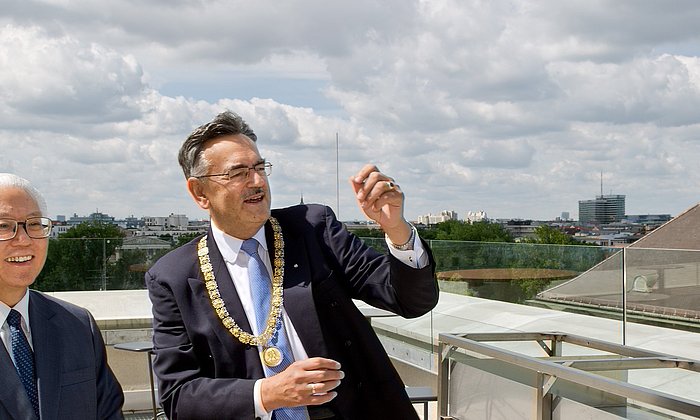Outstanding commitment honored at the Dies academicus
2019: A turbulent, eventful and highly successful year

Prof. Wolfgang A. Herrmann’s era as President of TUM came to an end in September after 24 years. His successor Prof. Thomas F. Hofmann looked back on the outstanding successes of this year, including the development of a sensitive robot skin, the gain of the seventh Humboldt Professorship – for artificial intelligence in medicine – and the German Future Prize for the spin-off Celonis.
The most significant event will also shape the years to come: TUM has once again been recognized as a University of Excellence for the future concept "TUM Agenda 2030". TUM will reorganize itself into schools in order to better deploy innovative research and teaching with an even more cross-disciplinary form. Together with social sciences, the engineering sciences will be oriented towards human-centered, trustworthy and socially compatible innovations. Unique career opportunities for the mid-level academic sector and attractive offers for lifelong learning for alumni complement the promotion of talent beginning in the first semester and lasting until the professorship.
President Hofmann moderated a discussion in which Prof. Daniel Cremers, Prof. Ruth Müller, student Jonas Papazoglou-Hennig and doctoral candidate Mareike Thiedeitz considered the question "Why does the future need us, TUM?". Together they explored new development potentials on the road to becoming a global university whose actions are guided by a sense of responsibility. Three start-ups illustrated how students can go on to become founding entrepreneurs.
Dies academicus 2019
TUM Sustainability Award presented for the first time
Prominent individuals were recognized today and at the TUM Awards Dinner in the run-up to the annual Dies academicus celebration. The TUM Sustainability Award made its debut, recognizing research innovations that promise a decisive contribution to the ecological transformation of business and society. The TUM Entrepreneur of Excellence Award honored the serial founder Felix Haas as a shining example for future generations of founding entrepreneurs.
TUM presented the following awards:
TUM bestows this honor on individuals for long-time dedication to service in developing the university's future.
Dr.-Ing. Karl Busch: After completing his studies and earning his doctorate at TUM, the entrepreneur built Busch Vacuum Pumps and Systems into the world’s market leader. He is a very frequent donor and has also provided generous support to the TUM University Foundation.
Prof. Dr.-Ing. Rudolf F. Schwarz: The TUM civil engineering graduate had a successful career at industrial service provider IABG, expanding collaboration with TUM in aerospace and aeronautics as IABG general manager and owner. Since 1997 he has taught TUM students as an honorary professor and supports talented young academic individuals as a professional and career planning mentor. Schwarz is one of the founding members of the TUM University Foundation.
TUM awards the Golden Ring of Honor for outstanding performance in research, teaching, support for talented young scientists or educational and university policy.
Dr. Hannemor Keidel: The political scientist became TUM's first female Vice President in 2000 and was responsible for international relations. In 2011 she took on the new position of Vice President for Diversity & Talent Management. As the President's Delegate Officer for the redesign of the Bavarian School of Public Policy, starting in 2014 she placed the substantive focus of the School on the mutual interactions of technology and politics.
Barbara Stamm, President of Bavarian State Parliament (Ret.): As the Bavarian State Minister for Labor and Social Structure, Family, Women and Health from 1994 until 2001 and as President of the Bavarian Parliament from 2008 until 2018 Barbara Stamm worked hard towards achieving the equality of women and men. This focus informed her work as a member of the University Board of Trustees, where she has been instrumental in shaping support for female students and scientists.
Dr. Hermann Balle, State Minister (Ret.) Dr. Wolfgang Heubisch and Prof. Dr. Arnulf Melzer were also honored with the Golden Ring of Honor in September, as was former President of the Republic of Singapore Tony Tan in July.
TUM awards Honorary Citizenship to individuals who have made a long-term contribution to promoting civic-mindedness around the university community.
Dipl-Ing. Dipl.-Wirtsch.-Ing. Christian Leicher: After completing his studies at TUM in both electrical engineering and in labor science and economics, he represented the third generation of his family in taking the helm as CEO of Rohde & Schwarz. The measurement technologies and telecommunication systems company was one of the first TUM Partners of Excellence when the TUM University Foundation was formed. Christian Leicher has also made personal donations and was for years active in the foundation's council and in the 150th Anniversary Fundraising Committee.
The TUM Sustainability Award is presented for innovative research work that promises to make decisive contributions to the ecological transformation of business and society.
Prof. Dr. Thomas Brück: The holder of the Werner Siemens Endowed Chair for Synthetic Biotechnology is developing new biocatalyst systems using algae, yeasts and other microorganisms for high-quality chemical substances. His algae biotechnology uses photosynthesis to turn CO2 into algae oil which can be used in the production of aircraft fuels. In addition, he has succeeded in producing carbon fibers from algae oil which can then be used to make high-strength composite materials.
The Friedrich Schiedel Stiftung and the Technical University of Munich (TUM) present the award to outstanding individuals who have contributed to deepening our understanding of the mutual interactions of politics, society and technology.
Prof. Henry Farrell, Ph.D.: Henry Farrell belongs to a new generation of political scientists who develop theories aimed at understanding the political impacts of the rapid pace of technological change. His research focus areas are the politics of the internet and questions of democracy as well as international and comparative political economics. He has been a professor of political science and international relations at George Washington University since 2017.
TUM presents the award to exemplary entrepreneurs.
Felix Haas: Haas was still in school when he founded his first internet company. After completing his studies in electrical engineering at TUM, he immediately founded not one but two companies: Felix Haas Investments has already funded more than 50 internet start-ups in Germany. The World Economic Forum (WEF) honored his online event management platform Amiando as a Global Technology Pioneer. In 2013 Haas once again demonstrated his spirit for entrepreneurial innovation with the founding of IDNow. Since 2014 he has organized and conducted the yearly start-up conference "Bits & Pretzels".
The TUM Supervisory Award honors exemplary supervision of doctoral candidates. The recipients of the award are selected by the TUM Graduate Council, which represents the doctoral candidates. The endowment of 5,000 Euros is funded by the TUM Graduate School.
Prof. Dr. Sonja Berensmeier: The holder of the Professorship for Bioseparation Engineering has been honored successfully combining academic support with a stimulating working environment achieved through joint activities. In addition to individual supervision, the doctoral candidates also recognized her support for international networking.
The Johannes B. Ortner Foundation presents awards to outstanding young researchers at TUM. This year's winners:
Dr. Barbara Berger, Department of Architecture, doctoral thesis "Der Gasbehälter als Bautypus – Baukonstruktionsgeschichte des 19. und frühen 20. Jahrhunderts. In England entwickelt, in Deutschland optimiert, weltweit verbreitet – gezeigt am Beispiel Italiens" (The gas container as a structural type – The history of construction design in the 19th and early 20th centuries. Developed in England, optimized in Germany, distributed worldwide – Using the example of Italy)
Verena Stammberger, TUM Department of Civil, Geo and Environmental Engineering, Master's thesis "Murgang-Potential in den Alpen: Monitoring und Modellierung im Roßbichelgraben (Oberstdorf, D) und Wildenbach (Hinterhornbach, A)" (Potential for mudflows in the Alps: Monitoring and modeling in the Roßbichelgraben (Oberstdorf, Germany) and Wildenbach (Hinterhornbach, Austria))
Dr. Sophie Solchenbach, Department of Chemistry, doctoral thesis "Methods to elucidate fundamental electrolyte reactions in Li-ion-batteries"
Dr. Maria Teresa Berndt, TUM School of Medicine, doctoral thesis "DTI zur Analyse struktureller Konnektivität bei Schreibkrampf" (DTI in the analysis of structural connectivity in writer's cramp)
Caroline Roeger, TUM School of Management, Master's thesis "Information Integration across Products and Time – A Behavioral Experiment on Human Decision-Making”
Florian Seefried, TUM School of Life Sciences Weihenstephan, Master's thesis "Development of a system to classify interactions in binding and activity assays"
TUM awards the Heinz Maier-Leibnitz Medal for outstanding research achievements.
Prof. Dr. Michael W. Pfaffl was presented with the medal in July, as was Prof. Dr. Markus Schwaiger in September.
The Karl Max von Bauernfeind Medal is awarded to individuals who have displayed outstanding dedication to the university.
Dr. Martin Pabst was presented with the medal in September.
TUM and Clariant present the Dr. Karl Wamsler Innovation Award for outstanding achievements in the field of catalysis.
Prof. Dr. Dr. h.c. mult. Wolfgang A. Herrmann was presented with the award in September.



